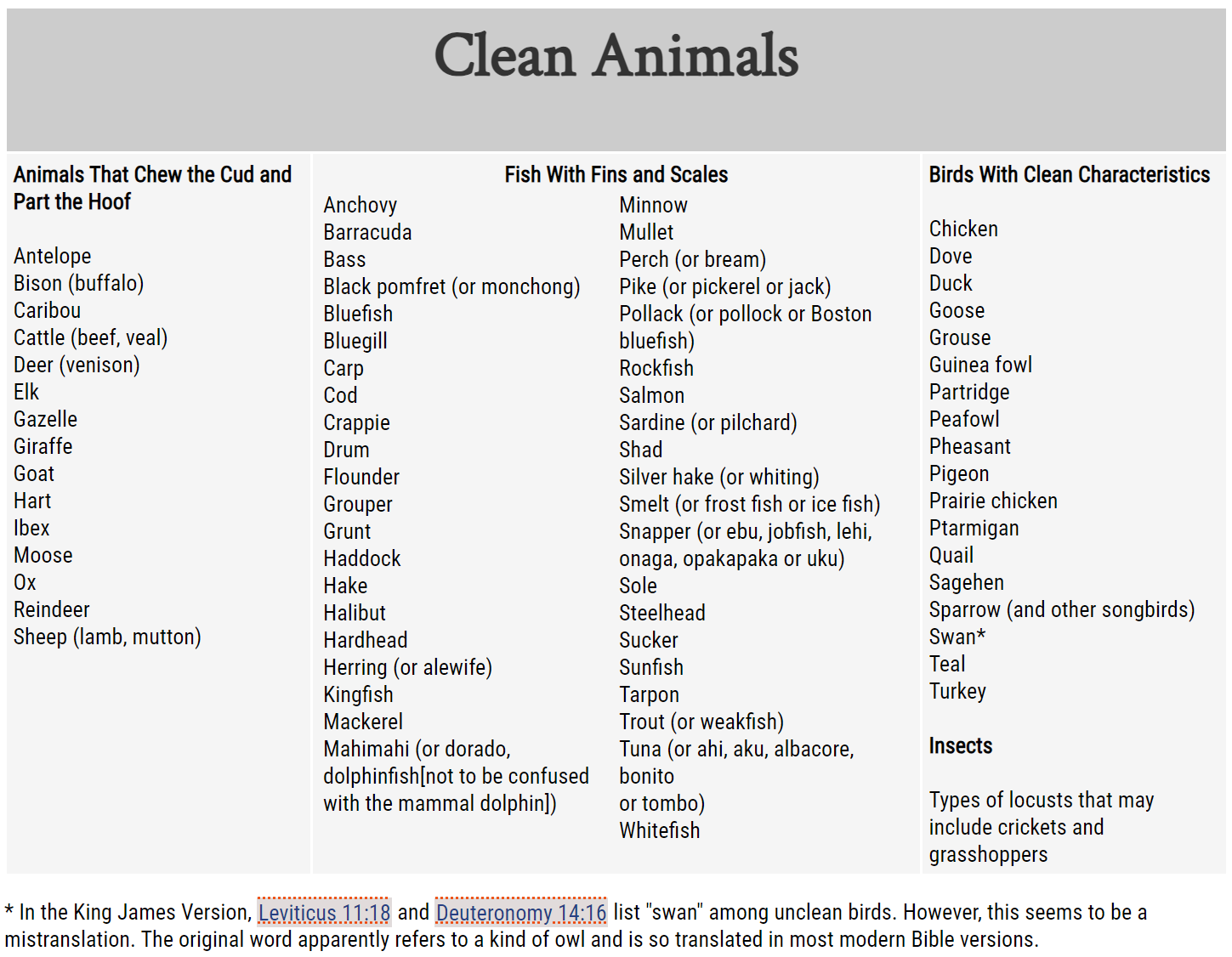Why Christians Should Still Care About Clean and Unclean Meats
One of the most overlooked parts of Scripture is also one of the most practical: God’s laws about what is “clean” and “unclean” when it comes to food. Many Christians assume these instructions were given only to ancient Israel, or that they were abolished at the cross. Yet when we carefully read the Bible cover to cover, we see a consistent message: God cares what His people eat, and His reasons go far deeper than mere health fads or “Jewish tradition.”
The Origin of the Distinction
The distinction between clean and unclean animals existed long before Moses received the law at Sinai. Noah already knew which animals were clean and which were not when he brought them into the ark “by sevens” versus “by twos” (Genesis 7:2). This was nearly a thousand years before God made His covenant with Israel. Clearly, these categories were part of God’s design from the beginning, not just a temporary Israelite regulation.
The Purpose: Holiness
Leviticus 11 and Deuteronomy 14 spell out which meats are acceptable and which are not. But the “why” behind these laws is even more striking: “You shall be holy, for I am holy” (Leviticus 11:44). The dietary laws were not about arbitrary restrictions, but about reflecting the holiness of God in daily life. By abstaining from what He calls “detestable” (Deut. 14:3), His people show that they belong to Him, set apart for His purposes.
The New Testament repeats this call. Peter quotes the same command (“Be holy, for I am holy”) as binding for Christians (1 Peter 1:14–16). Paul also urges believers not to touch what is “unclean” (2 Corinthians 6:17). Holiness, in God’s eyes, extends even to our diet.
Misunderstood Passages in the New Testament
Several passages are often misread as abolishing the food laws, but closer study shows otherwise:
- Peter’s Vision (Acts 10): Peter himself explained that the vision was not about food but about people—that Gentiles should not be considered “unclean.” A decade after Christ’s resurrection, Peter still declared he had never eaten anything unclean.
- Romans 14: Paul’s concern was meat sacrificed to idols, not pork or shellfish. The word he used for “unclean” (koinos) referred to ceremonial contamination, not to biblically unclean species.
- Mark 7: Jesus was correcting Pharisaic traditions about hand-washing, not overturning God’s dietary distinctions. The digestive system does not make pork holy.
- 1 Timothy 4: Paul condemned false teachers who commanded abstinence from foods “which God created to be received.” That phrase automatically excludes animals the Word of God designates as unclean.
Taken in context, none of these passages nullify God’s commands about diet. In fact, the apostles themselves continued to live by them.
Health and Practical Wisdom
Though the biblical reason is holiness, modern science provides additional insight. Animals labeled unclean in Scripture are often nature’s garbage collectors—scavengers, predators, or bottom-feeders. Pigs thrive on filth; shellfish filter sewage; vultures eat carrion. When humans eat these animals, we join a food chain filled with toxins, parasites, and harmful substances. Doctors, nutritionists, and medical researchers increasingly affirm that avoiding pork and shellfish leads to measurable health benefits.
As one nutritionist put it, many of these creatures were designed to “clean up after the others.” They serve a purpose in the ecosystem, but not on our dinner plate.
Future Accountability
Prophecies about the end times confirm that the distinction between clean and unclean meats still matters to God. Isaiah foresaw judgment against those who eat swine’s flesh and other abominations at the time of Christ’s return (Isaiah 66:15–17). Revelation also speaks of unclean creatures in symbolic visions of the end (Revelation 18:2). If these distinctions are meaningless, why does God continue to use them as moral categories in the last days?
A Call to Faithful Obedience
Ultimately, keeping the biblical dietary laws is not about legalism, nor is it about earning salvation. It is about obedience, holiness, and aligning ourselves with God’s design. Just as we obey Him in matters of morality, worship, and relationships, so too should we obey Him in what we eat. His laws are not burdensome (1 John 5:3). They are gifts meant for our good.
For the Christian who desires to live fully set apart for God, embracing His wisdom about clean and unclean meats is not an antiquated ritual. It is a living testimony of faith, a declaration that we take His Word seriously in every area of life.
For your convenience, feel free to save the following image to your phone and refer to it when in doubt:


